- FAMA
- Researchers
-
Projects
- MESPI
- Knowledge Production Project >
-
Political Economy Project
>
- Development and the Uprisings
- Class Formations and Dynamics
- The Palestinian Economy: Fragmentation and Colonization
- Tunisia: A Political Economy in Transition
- Migrant States, Mobile Economies: Rethinking the Political in Contemporary Turkey
- Political Economy of the Middle East: Continuities & Discontinuities in Teaching & Research
- 2016 Political Economy Institute
- The Lebanon Project >
- The Palestine Project >
- The Civil Society Project >
- Middle East Media Project >
- The Egypt Project >
- Refugees and Migrants Project >
- Black-Palestinian Transnational Solidarities Project
- Initiatives
- Events
- Summer Institutes
- Internships
- Blog
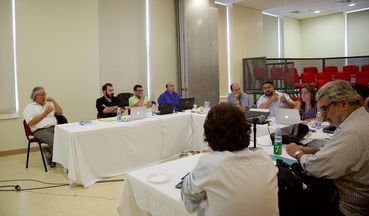 28 July 2015 @ 9:00am - 7:00pm American University Beirut, Lebanon Sponsored by the Arab Studies Institute, Middle East Studies Program (GMU) & The Issam Faris Institute for Public Policy & International Affairs (AUB) The meteoric expansion of the ISIS movement in Iraq, Syria and beyond during the past year has led to numerous, often conflicting interpretations of this phenomenon and its seeming success, as well as divergent perspectives on its prospects and future. The workshop, “Understanding the ISIS Phenomenon”, jointly convened by the Arab Studies Institute and the Issam Faris Center of the American University of Beirut on 28 July 2015, sought to promote and provide a multi-dimensional, inter-disciplinary examination of its subject. The purpose of this workshop was to achieve a comprehensive understanding of the Islamic State phenomenon, both in terms of the contextual factors that have produced it; its territorial, organizational, political, socio-economic, and religious-theological features; the extent of continuity and change with respect to other Islamist and particularly other radical Jihadi movements; and informed discussion on its further trajectory.
0 Comments
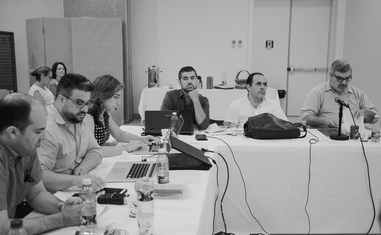 27 July 2015 @ 9:00am - July 28, 2015 @ 7:00pm Beirut, Lebanon Sponsored by the Arab Studies Institute & George Mason University's Middle East Studies Program On 27-28 July 2015, Ziad Abu-Rish and Mona Harb co-convened a two-day research workshop entitled “State Building, Public Institutions, and Social Mobilization in Lebanon: 1943-1958.” The workshop featured an inter-disciplinary group of scholars, 9 of whom were present and additional 5 of which participated remotely. Each of these 14 researchers either directly study the early independence period of Lebanon or engaged in research projects that rely on specific understandings of the period. The topical focus of the workshop is an attempt to both fill a major gap in the scholarly literature on Lebanon as well as to challenge static and exceptional frameworks of state formation and nation-building in the country. The first day of the workshop featured introductions and individual presentations, which were grouped thematically and followed by focused discussion and feedback. The second day was geared toward tackling the commonalities across all presentations in terms of major themes, methodological challenges and opportunities, as well as future plans. It also featured an exclusive visit of the Archives and Special Collections of the American University of Beirut, the staff of which had curated a small exhibition of documents related to the workshop topic and time period. This workshop represents the first meeting of what is planned to be an ongoing and expanding research working group that is a forum for both scholarly exchange and public engagement in Lebanon. To that end, the workshop culminated in a public event which was moderated by Mona Harb and featured four other worship participants. The event brought out more than 70 people in attendance, as the auditorium was standing-room only. Since the public event, a number of senior scholars and laypersons in attendance have commented about the diversity and substantiveness of the presentations. As one esteemed attendee put it, “I live in Lebanon and research issues in the country. This was the best event to learn about Lebanon I’ve ever been to.” A complete workshop report, including a concept note, presenters’ biographies and abstracts, and discussion highlights, will be published before the end of 2015. 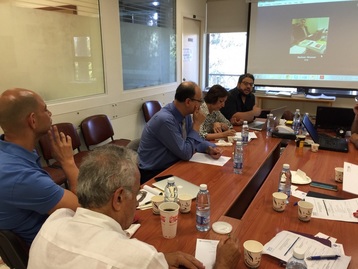 24 July 2015 @ 9:00am - 7:00pm American University Beirut, Lebanon Sponsored by the Arab Studies Institute & George Mason University's Middle East Studies Program Since 1992, the Arab Studies Institute has been engaged with producing, analyzing, and scrutinizing knowledge production on the region through its five subsidiary organizations. Most pertinent to this workshop is the Knowledge Production Project, which started briefly in the 1990s, but then resumed in 2007-2008. Its aim is to collect, organize, and analyze knowledge produced on the Middle East in the English language since 1979, in seven databases (see accompanying summary). This ambitious project is both unprecedented and potentially revolutionary, and is now in its advanced stages. At this point, we are turning our attention to knowledge produced in the region about the region, broadly conceived. Few challenges exist. Bibliometrics (statistical indicators of publications) is still considered the most reliable source on scientific production, mainly because it is independent of national authorities. Only two large multidisciplinary databases of citations exist, produced by two major publishing entities. Thomson produces the Web of Science (WoS), and Elsevier produces Scopus. Both databases are also commercial activities as much as they are sources of information. While they are not the only two sources available for bibliometric analysis, they share the aim of being multidisciplinary, independent, and of providing information on author affiliations and citations. Scopus covers more journals and other publications than Web of Science. While these databases don’t cover the Arabic references, recently, there are several newly established initiatives that address this: the databases E-Marefa and al-Manhal include academic material that cover full texts of academic and statistical journals as well as theses and dissertation. Based on that, we held a one-day meeting between different partners in order to accomplish the following: - Establish professional familiarity with existing projects, their directors, and their trajectories - Explore avenues for collaboration and partnership - Reduce overlapping agendas going forward and create synergy among projects The meeting was held on July 24 at the American University of Beirut, and accommodated up to 10 participants who brainstormed in Arabic and English. The Refugees & Migration Project: Refugees in Lebanon, Setting a Research & Advocacy Agenda7/16/2015 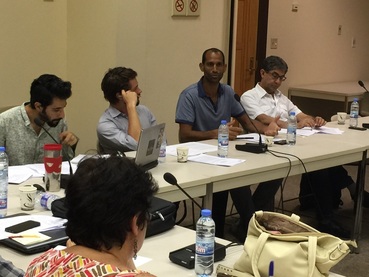 16 July 2015 @ 9:00am - 7:00pm Beirut, Lebanon Sponsored by the Arab Studies Institute & George Mason University's Middle East Studies Program The Refugees & Migrants Project seeks to create a resource for scholarly production and advocacy on refugee, stateless, internally displaced, and migrant populations throughout the Middle East. The Middle East is home to the largest concentration of refugee populations globally. The largest amongst these are Palestinian refugees produced as a result of war who are stateless in some contexts, internally displaced in others, and victims of secondary and tertiary displacement in still other contexts. They also include an influx of Iraqi refugees engendered by the 2003 US war against, and occupation of, Iraq. Since the advent of the Arab Uprisings, these refugee communities have steadily grown in the face of armed conflict and civil unrest in the region, particularly in Syria, Libya, and Yemen as well as in the Sudan and Somalia. The Middle East is also the site of a significant migrant labor force. These migrants constitute a significant domestic, service, and construction labor force with relatively little to no government regulation. The lack of greater oversight together with their diminished political power subjects this vulnerable population to considerable exploitation. Beyond those populations who have been forcibly displaced or who have voluntarily sought economic opportunities across borders are a number of other stateless populations suffering from de facto and de juren statelessness like the Kurds of Syria as well as the children of refugee men and/or of women born out of wedlock in Lebanon and Egypt, for example. The region’s density of migrant and refugee communities is not commensurate with the scholarly research, civil society advocacy, or social awareness regarding their conditions. This Project seeks to encourage scholarly production, advocacy efforts, and political awareness concerning transitory populations across the Middle East. It aims to address pertinent questions regarding applicable law, the socio-political status of these communities, as well as the political initiatives necessary to address their pressing needs. The Lebanon Workshop consisted of a half-day roundtable that put stakeholders, institutions, and agencies concerned with refugees into conversation with one another. The purpose of the roundtable was to evaluate how a set of decentralized factors, namely stakeholders, aid, and law, intersect and shape the conditions and prospects by refugee communities within Lebanon. To this end, the discussion sought to identify existent refugee communities within Lebanon; to identify the humanitarian conditions they endure; to assess the services available to them as well as the relative disparities among them as a result of government intervention, foreign aid, and available social services; and to evaluate the legal regimes (refugee, civil, and criminal) regulating the lives of refugees including their migratory flow, their status within Lebanon, as well as their access to employment. Lessons learned from the proceedings should also inform how to initiate similar workshops in other countries that host significant refugee populations like Jordan, Egypt, Tunisia, and Turkey. |
Forum on Muslim and Arab AffairsFAMA is the research arm of the Arab Studies Institute. Archives
June 2017
Categories |
- FAMA
- Researchers
-
Projects
- MESPI
- Knowledge Production Project >
-
Political Economy Project
>
- Development and the Uprisings
- Class Formations and Dynamics
- The Palestinian Economy: Fragmentation and Colonization
- Tunisia: A Political Economy in Transition
- Migrant States, Mobile Economies: Rethinking the Political in Contemporary Turkey
- Political Economy of the Middle East: Continuities & Discontinuities in Teaching & Research
- 2016 Political Economy Institute
- The Lebanon Project >
- The Palestine Project >
- The Civil Society Project >
- Middle East Media Project >
- The Egypt Project >
- Refugees and Migrants Project >
- Black-Palestinian Transnational Solidarities Project
- Initiatives
- Events
- Summer Institutes
- Internships
- Blog
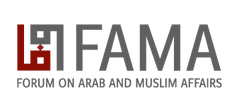
 RSS Feed
RSS Feed
